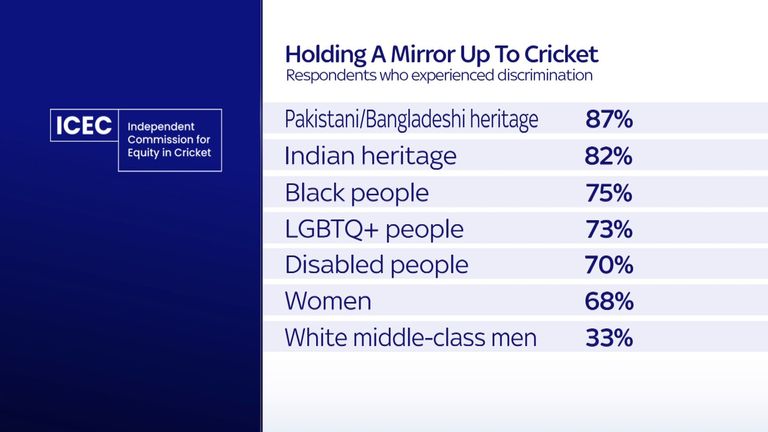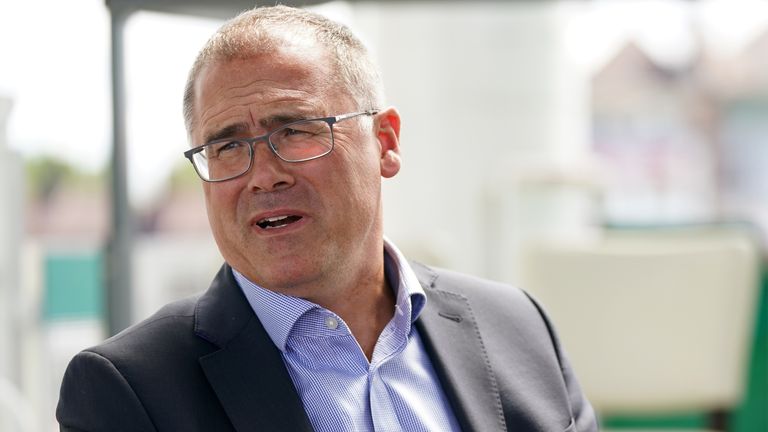English cricket 'deep-rooted' in racism, sexism, and classism, report by ICEC finds
Report by the Independent Commission for Equity in Cricket says racism is "entrenched" in English cricket; women are marginalised and there is no focus on addressing class barriers; more than 4,000 provided evidence. Warning: This article contains content which users may find distressing
Tuesday 27 June 2023 18:53, UK
English cricket is deep-rooted with widespread institutional racism, sexism and class-based discrimination, a report has found.
The England and Wales Cricket Board issued an unreserved apology for the failings highlighted in the report and to the victims of discrimination in cricket, and will work over the next three months on a package of reforms based on the 44 recommendations within the report.
The ECB must commit to being an anti-racist, anti-sexist and anti-classist organisation and encourage all other cricketing organisations to do the same.
Within the next six months, it must put in place mandatory, specialist, high-quality training to support the development of racial literacy amongst its leadership and the most senior leadership of the wider game.
Within the next 12 months, it must undertake an in-depth examination of the decline of cricket in Black communities in England and Wales and develop a targeted action plan to reverse that decline.
The ECB must increase, at pace, the levels of investment in the core infrastructure and operations of the women's and girls' game. There must also be a fundamental overhaul of the professional women players' pay structure with equal pay at domestic level by 2029 and at international level by 2030.
"We certainly apologise to anybody that has felt excluded or discriminated against," ECB chairman Richard Thompson told Sky News. "Reading those lived experiences clearly was very shocking to read what people have experienced in a way that they should never have had to have done."
More than 4,000 people provided evidence to the Independent Commission for Equity in Cricket which found:
•Half of respondents experience discrimination;
•Racism is entrenched in cricket;
•Women are marginalised and routinely experience sexism;
•Little to no focus on addressing class barriers;
•Complaints systems are confusing and not fit for purpose;
•Equity, diversity and inclusion requires significant improvement.
It was the murder of George Floyd in 2020 and global outrage over institutionalised racism that sparked the ECB into commissioning a report from Cindy Butts.
Around the same time, Azeem Rafiq called out racism within cricket in England.
"All the stories that Azeem Rafiq talks about, that all happened to me," a former player of Pakistani heritage told the investigators.
"All the abuse, the isolation, the hatred. [Team-mates] poured alcohol on me. They threw bacon sandwiches at me. I have lived with all that and never spoke to anyone about it."
The frustrations faced reporting abuse were clear in the account of a recreational player of Indian heritage.
"Myself and a fellow player were called terrorists after a game," he said. "We complained to the opposition Chair and, after an initial apology, the Chair decided that he wanted to defend the person who made the remark and that we were attempting to defame the club and they were the victims."
The ICEC report now runs to more than 300 pages - highlighting issues that were not adequately addressed after a previous ECB racism report 24 years ago.
"I think it's absolutely disgraceful," Ms Butts told Sky News. "It was really difficult to find evidence to show that has been properly dealt with. That's really disappointing. And it needs to be dealt with now."
The report says: "Our evidence shows that elitism alongside deeply rooted and widespread forms of structural and institutional racism, sexism and class-based discrimination continue to exist across the game."
But Ms Butts does not believe a new national governing body is required.
"I believe that they are committed to making the changes that are necessary," Ms Butts said. "We haven't shied away from saying that the ECB itself needs to substantially reform in the way that it carries out its regulatory role shows its commitment to issues of equity.
"There are training needs. We talk about the lack of racial literacy, for example, within the ECB.
"So there are a number of things that I think point to ways in which we have recommended that the ECB can improve. I don't think at this stage, disbanding the ECB will help to deliver all of the really important things that we think now need to happen."
A statement from Azeem Rafiq in response to ICEC's report on equity in cricket read: "I welcome the report's findings and acknowledge the extraordinary work that has been put into this inquiry.
"There is no doubt now that the game we all love has suffered from institutional discrimination, including racism.
"This report is an opportunity to fully reflect on what has happened and for the sport's governing structures to work out a way forward to ensure that cricket is a game for everyone and that they feel supported, no matter their background."
ECB's Thompson: We apologise and need to address concerns | 'We want to be country's most inclusive sport
ECB chairman Richard Thompson speaking exclusively to Sky News' sports correspondent Rob Harris...
"We certainly apologise to anybody that has felt excluded or discriminated against. And reading those lived experiences clearly was very shocking to read. People have experienced in a way they should never have had to have done.
"We've been given by ICC three months to look at each of the recommendations carefully. There are 40 principle recommendations and a whole series of sub-recommendations.
"And in those three months, we will look at the whole collective basket presented to us and then come back at the end of three months, or before, to see what and how we can go about addressing them and implementing them.
"These things exist in all sports. Cricket was brave enough to show real leadership and commission this report the first time.
"No one asked cricket to commission this report. This is why it's taken two-and-a-half-years to bring this report about.
"It's an extraordinary report: 350 pages, 100 recommendations in total. And this is something I'm sure other sports will look closely at as well, to, as the report is entitled, hold a mirror up to themselves.
"Sometimes when you look in the mirror, there are things there you don't like the look of, and certainly we need to address this now.
"We could look back or we could look forward. Now we have a predominantly independent board, the structures are very different to the structures that existed then. I think we can focus now with real optimism in our ability to bring about real change.
"When I became elected 10 months ago, I made a very clear and unambiguous recommendation that I wanted cricket to become the country's most inclusive sport.
"This report, I think, will help that happen now. It will accelerate that change, where I believe cricket reaches communities that no other sport does. That should be our superpower and not become a weakness. So I believe now we really go about that change with real gusto.
"I don't know [is this English cricket's biggest day of shame?]. I mean, I think it's the start of a new beginning. And I think we will use this report to create a start and the all-inclusive game that I certainly want for English cricket."
Gould: Report shows English cricket faces "existential threat"
Cricket in England and Wales faces an "existential" issue if it fails to address the failings highlighted by a new report, England and Wales Cricket Board chief executive Richard Gould has said.
Gould said: "It is an existential issue for the sport. This is a report that the ECB specifically asked for two and a half years ago, and deliberately did not set narrow parameters.
"The game wants to understand, we want to understand, the seriousness of the issues and that's why we're grateful to the commissioners.
"You talk about direct language - we wouldn't want it in any other way because then it leaves us in no doubt as to the state of the game and what needs to be done in order to drive forward.
"This report is a seminal moment for us. It helps us to fully understand the scope of the issues within the game, it allows us to understand the apologies that we quite rightly make to those people that suffered discrimination.
"We are determined to be able to act on this report and deliver on its intent in the coming months.
"This report will contain lots of information which will come as a shock to many and many people will be disappointed by. But there's also a huge amount of determination throughout the game, throughout the country, to make sure that cricket can deliver and in only a way that cricket can."
Stokes: We must go further
In a statement on Tuesday, England men's Test captain Ben Stokes said: "To the people involved in the game who have been made to feel unwelcome or unaccepted in the past, I am deeply sorry to hear of your experiences. Cricket is a game that needs to celebrate diversity on all fronts because without diversity this game would not be where it is at today.
"As a sport we need to learn from past mistakes and do all we can to make people feel safe and be themselves at every level. I have been an England player since 2011 and I feel very fortunate to be part of some incredibly diverse teams and love how everyone has a different story to tell.
"We must go further and be more inclusive and diverse because the game I love and the millions worldwide love should be enjoyed without fear of discrimination or judgement whether that be due to your upbringing, race or gender.
"As I said earlier, everyone has a different story to tell. I am Ben Stokes, born in New Zealand, a state-educated pupil who dropped out of school at 16 with one GCSE in PE. I need help with the spelling and grammar in this speech and I am currently sitting here as the England Men's Test captain.
"It is clear there is so much more the game has to do and as players we really want to be part of that to ensure that this is truly a sport for everyone."
Rafiq: Report 'embarrassing' for cricket | No knee-jerk reactions
Azeem Rafiq, who spoke out about his own experience of racism within cricket, has said the report is an "embarrassing read" for all those involved in the game.
He is, however, glad to see the ECB is putting a three-month plan in place rather than rushing to a solution.
"It has been incredibly tough. It felt like I have been called everything possible really and attacked in every way possible because the people knew it would get to the reality of the game and this is the reality of the game," Rafiq told Sky Sports.
"I like how the ECB is going to take three months to create a strategy. It is important there are no knee-jerk reactions.
"It is important for cricket to understand it has put people through a lot and it is for cricket to make sure it goes out and undoes that and builds trust back which takes time.
"It can't be through PR initiatives and box-ticking exercises, it has got to be thorough.
"They have got to understand what they are trying to achieve, what does change look like, and who is going to drive it.
"People want this to be just Azeem Rafiq's experience and it just isn't. It isn't just my experience it is the experience of a lot of people and even now, last week I had phone calls about discrimination in cricket.
"There is a lot that still needs to be resolved and I just want leaders in sport to get away from going out there and telling the world how great they are within two weeks just because they did an event.
"They need to understand these small things matter, they will help, but they are not going to stop what happened to me happening again.
"Until these leaders grasp that we are going to be battling these things. Ultimately it is all down to priorities. We have heard the talk before and we are hearing it again.
"This is an opportunity for us all to come together and make sure we can be proud of our game. What we have seen today on that paper should embarrass us all and is the true reality of our game.
"Those it hasn't discriminated against need to play a bigger part. But it shows where cricket people are."
Cricket Scotland: We remain determined to make change
Following the release of the report, Cricket Scotland released the following statement, reaffirming their commitment to "leading on ensuring the required change takes place".
"Cricket Scotland reaffirms its desire to tackle racism, discrimination, and inequalities within the sport in our own country.
"While today's ICEC report is completely separate and distinct from last year's "Changing The Boundaries" report, which highlighted institutional racism within this organisation, there are many findings and messages contained within in it which echo the issues faced by cricket in Scotland.
"Cricket Scotland is fully committed to carrying out all the recommendations of the "Changing The Boundaries" report, and together with sportscotland and our partners, support the ongoing independent investigative process.
"We remain conscious that many people have endured considerable suffering as a result of this process, and the organisation is committed to supporting all involved through to its conclusion and beyond.
"We are in no doubt that much work still needs to be done to change cricket to the point where it can be considered an inclusive sport that is free from racism and discrimination. We remain absolutely determined to lead on ensuring that the required change takes place."
Report confirms 'deep-seated issue' - Dinenage
Dame Caroline Dinenage MP, chair of the House of Commons' Culture, Media and Sport Committee, hopes the report prompts significant change in the sport.
She said: "Today's report confirms the Culture, Media and Sport Committee's finding 18 months ago that there is a deep-seated issue of racism in cricket.
"The volume of evidence, not only of racial discrimination but also of sexism and elitism, is unacceptable in a sport that should be for everyone, and must now be a catalyst for change.
"The test now for the new leadership of the ECB is to ensure the whole sport is a welcome and inclusive place for all. We welcome their recognition of the need to reset, and look forward to making sure they follow through on their commitments."











